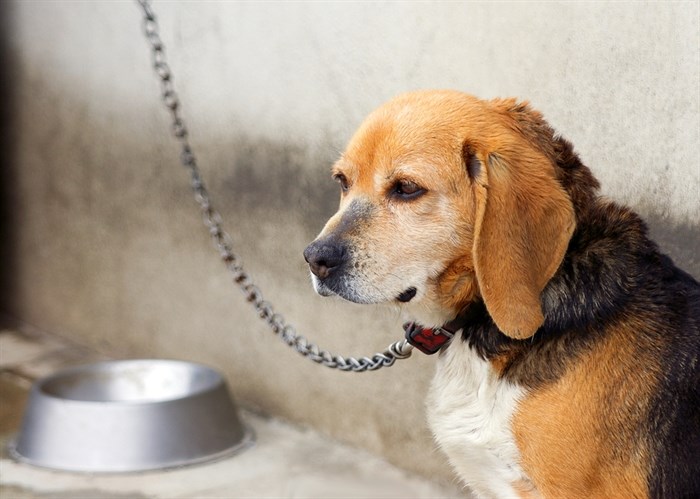
Stock image for illustration purposes only.
Image Credit: Shutterstock
December 06, 2015 - 10:30 AM
“IT’S LIKE THE WILD WEST”
VERNON - The words ‘dog rescue’ may have a ring of nobility to them, but according to animal welfare advocates, many home-based operations aren’t what you think.
Kim Faulkes, an Ottawa-based animal advocate, says there are no standards in place to ensure so-called ‘dog rescues’ operate ethically.
“It’s a free-for-all. Basically anyone that has access to the Internet and Facebook can create a group, start collecting funds and start taking in animals with no plan, no concrete processes.”
Home-based rescues that operate with a network of fosters who care for the dogs until an adopter is found are popping up at a rapid rate across the country, including Vernon. While Saving Grace Dog Rescue has now shut down, Faulkes says she's heard many stories like our story describing a number of questionable practices.
“It’s happening all across Canada,” she says.
Virtually anyone can open up a dog rescue and be fairly confident no provincial or federal agency will be looking over their shoulder to ensure things like vet checks, adopter screening, and financial reporting is done right, Faulkes says. It’s up to individual rescues alone to create policies and adhere to them.
Faulkes works for an organization that supports pet owners during trying situations, but she used to run a rescue herself. Her standards included keeping dogs in care a minimum of two weeks to provide time for vet checks, shots and spay and neutering. It was also time for behavioural assessments. Rescue staff, usually with the help of a dog trainer, would work with the dog to assess behaviour. The rescue also had a strict adoption process that included multiple home checks and references. She admits it was a lot of work, but says it was the responsible, ethical way to run things.
“You do it for two reasons: One, it’s about your reputation. Do you want to adopt out multiple dogs with problems and have them returned? It would shut you down very quickly. Two, I took the dogs we were helping seriously enough to want to ensure they weren’t going to end up in a shelter again, that they were going to homes where they would spend the rest of their days. And I wanted the family to enjoy their new furry companion.”
Linda Rohdin, a long-time Vancouver Island animal welfare advocate, says home-based rescues that rely on foster networks are ‘like the wild west.’ She has worked with others in the animal rescue world to establish clear standards and regulations.
“The honour system doesn’t work and too many things are falling through the cracks, big time,” Rohdin says. “There’s implied standards, but nothing with any teeth, nothing you can use.”
She’d like to see mandatory registration for federal charity status with the Canada Revenue Agency, which at the very least requires organizations to file financial reports. That would provide some level of transparency and accountability and weed out some of the less professional rescues, she says. Currently, registering as a charity is optional, and many in B.C. — like Saving Grace — choose to instead register provincially as a non-profit society. That designation might provide the guise of credibility, Rohdin says, but all it means is registered societies have to file a report stating they held an annual general meeting. The details of the meeting, who was there, and how finances were handled is not required.
The only real standard that exists anywhere in Canada in terms of animal treatment lies with the animal cruelty act, which is upheld by the SPCA. Anything that doesn’t fit into that category — like the specifics of running a rescue — is missing from the regulatory side.
“How could you legally go after someone when there’s no set rules? You can’t,” Rohdin says.
Another big concern Rohdin has with the lack of regulations is what happens when dogs are imported from outside of the country. With no clear standards for vetting in place, she says the risk of sicknesses being carried in and spread to other dogs in rescues is a huge concern.
Ultimately, she believes a mandatory registry should be created, with a government agency in place to oversee it. She insists it can’t fall on the professional rescues themselves to educate and inform others how to run things properly — especially in such an emotionally-fraught industry.
“How prone do I think the industry is to corruption? I don't think everyone is evil by any means. There's just a broad spectrum of humanity out there," Rohdin says. "Generosity of spirit makes people do wonderful things — the problem is not all people are generous."
EDITOR'S NOTE: You might have expected to hear some context for this story from the B.C. SPCA, the supposed sheriffs in this wild, wild west of animal rescues. We did too. We are deeply disappointed that after numerous phone calls to the B.C. SPCA and various individual branches over the course of several months, the society that purports to 'speak for those who can't speak for themselves' chose many times to say absolutely nothing about this situation.
UPDATE TO EDITOR'S NOTE: The B.C. SPCA has since responded to this story and apologized for not returning several phone calls and emails. We are satisfied with the response and move forward. As expected, they offer a wealth of valuable and important information on this subject for a future story.
To contact a reporter for this story, email Charlotte Helston at chelston@infonews.ca or call 250-309-5230. To contact the editor, email mjones@infonews.ca or call 250-718-2724.
News from © iNFOnews, 2015